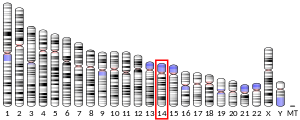SET domain containing 3 (SETD3) is a protein that in humans is encoded by the SETD3 gene.[5] It is a methyl transferase implicated in the replication of all enteroviruses. A mouse line deficient in SETD3 expression was shown to be immune to enterovirus infection. This could pave the way for the prevention of diseases like the common cold, myocarditis, aseptic meningitis and polio.[6] SETD3 is capable of methylating the cytoskeletal protein actin on histidine residues.[7][8]
In patients of the Estrogen Receptor-positive, and Luminal A-type breast cancer classification, a high expression of SETD3 is associated with better relapse-free survival, whereas in patients lacking expression of estrogen-, progesterone- and HER2/neu-receptor, and those affected by a p53-mutation, SETD3 was associated with poor relapse-free survival.[9]
Downregulation of SETD3 expression with small interfering RNA resulted in an inhibition of cytoskeletal function and invasiveness of triple-negative breast cancer cells.[9]
See also
editReferences
edit- ^ a b c GRCh38: Ensembl release 89: ENSG00000183576 – Ensembl, May 2017
- ^ a b c GRCm38: Ensembl release 89: ENSMUSG00000056770 – Ensembl, May 2017
- ^ "Human PubMed Reference:". National Center for Biotechnology Information, U.S. National Library of Medicine.
- ^ "Mouse PubMed Reference:". National Center for Biotechnology Information, U.S. National Library of Medicine.
- ^ "Entrez Gene: SET domain containing 3". Retrieved 2018-01-22.
- ^ Diep J, Ooi YS, Wilkinson AW, Peters CE, Foy E, Johnson JR, et al. (December 2019). "Enterovirus pathogenesis requires the host methyltransferase SETD3". Nature Microbiology. 4 (12): 2523–2537. doi:10.1038/s41564-019-0551-1. PMC 6879830. PMID 31527793.
- ^ Wilkinson AW, Diep J, Dai S, Liu S, Ooi YS, Song D, et al. (January 2019). "SETD3 is an actin histidine methyltransferase that prevents primary dystocia". Nature. 565 (7739): 372–376. doi:10.1038/s41586-018-0821-8. PMC 6511263. PMID 30626964.
- ^ Guo Q, Liao S, Kwiatkowski S, Tomaka W, Yu H, Wu G, et al. (February 2019). "Structural insights into SETD3-mediated histidine methylation on β-actin". eLife. 8. doi:10.7554/eLife.43676. PMC 6400499. PMID 30785395.
- ^ a b Hassan N, Rutsch N, Győrffy B, Espinoza-Sánchez NA, Götte M (February 2020). "SETD3 acts as a prognostic marker in breast cancer patients and modulates the viability and invasion of breast cancer cells". Scientific Reports. 10 (1): 2262. Bibcode:2020NatSR..10.2262H. doi:10.1038/s41598-020-59057-5. PMC 7010743. PMID 32042016.
Further reading
edit- Cooper SE, Hodimont E, Green CM (August 2015). "A fluorescent bimolecular complementation screen reveals MAF1, RNF7 and SETD3 as PCNA-associated proteins in human cells". Cell Cycle. 14 (15): 2509–19. doi:10.1080/15384101.2015.1053667. PMC 4613188. PMID 26030842.
- Pires-Luís AS, Vieira-Coimbra M, Vieira FQ, Costa-Pinheiro P, Silva-Santos R, Dias PC, et al. (2015). "Expression of histone methyltransferases as novel biomarkers for renal cell tumor diagnosis and prognostication". Epigenetics. 10 (11): 1033–43. doi:10.1080/15592294.2015.1103578. PMC 4844211. PMID 26488939.
External links
edit- PDBe-KB provides an overview of all the structure information available in the PDB for Human Actin-histidine N-methyltransferase (SETD3)



